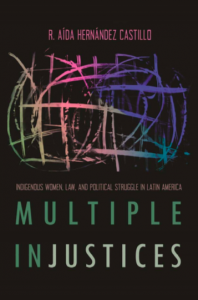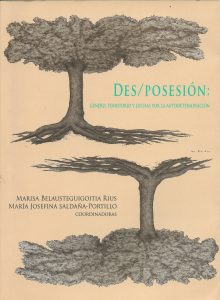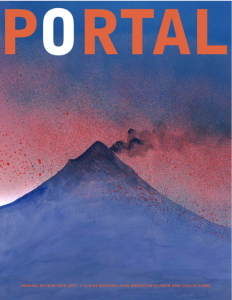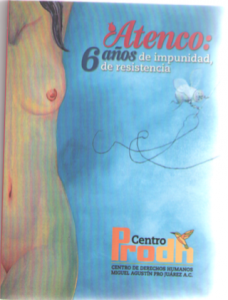
Born in Ensenada, Baja California, she earned her doctorate in anthropology from Stanford University in 1996. She is Professor and Senior Researcher at the Center for Research and Advanced Studies in Social Anthropology (CIESAS) in Mexico City. She worked as a journalist since she was 18 years old in a Central American Press Agency. Since she was an undergraduate she has combined her academic work with media projects in radio, video and journalism. Her academic work has promoted indigenous and women rights in Latin America. She has done field work in indigenous communities in the Mexican states of Chiapas, Guerrero and Morelos, with Guatemalan refugees and with African immigrants in the South of Spain. She has published twenty two books and her academic work has been translated to English, French, and Japanese. Her more recent book entitled Multiple InJusticies. Indigenous Women Law and Political Struggle in Latin America, will be published by University of Arizona Pres. She is recipient of the Martin Diskin Oxfam Award for her activist research and of the Simon Bolivar Chair (2013-2014) granted by Cambridge University for her academic work.
academic article: Racialized Geographies and the “War on Drugs”: Gender Violence, Militarization, and Criminalization of Indigenous Peoples
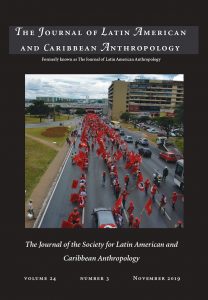 This article reflects on the impact of the “war on drugs” on the bodies and territories of indigenous peoples of Mexico. Taking as an analytical window the life histories of women victims of sexual violence in militarized and paramilitarized regions, as well as the histories of exclusion of indigenous women incarcerated in the context of the war on drugs, this research establishes connections between occupation through the violation, control, and incarceration of indigenous women’s bodies, and the occupation of their territories and dispossession of their natural resources. These processes take place simultaneously and respond to the neocolonial logics of capitalism, within which gender and race inequalities are essential for their reproduction.
This article reflects on the impact of the “war on drugs” on the bodies and territories of indigenous peoples of Mexico. Taking as an analytical window the life histories of women victims of sexual violence in militarized and paramilitarized regions, as well as the histories of exclusion of indigenous women incarcerated in the context of the war on drugs, this research establishes connections between occupation through the violation, control, and incarceration of indigenous women’s bodies, and the occupation of their territories and dispossession of their natural resources. These processes take place simultaneously and respond to the neocolonial logics of capitalism, within which gender and race inequalities are essential for their reproduction.
academic article: LA ANTROPOLOGÍA JURÍDICA FEMINISTA Y SUS APORTES AL TRABAJO FORENSE CON FAMILIARES DE DESAPARECIDOS: ALIANZAS Y COLABORACIONES CON “LAS RASTREADOREAS DEL FUERTE”
 In this article, the author reflects on her experience as a member o member of the Forensic and Social Anthropology Research Group (Grupo de Investigación en Antropología Social y Forense – GIASF), that work with families of disappeared persons. She analyses the work of Las Buscadoras de El Fuerte, an organization, which like many others in Mexico, is made up primarily of the mothers and wives of the disappeared, whom, in the face of the incompetence of the Mexican State, have given themselves to the task of searching in clandestine graves for the remains of their relatives. Through testimonies and ethnographic data, the author analyses the possibilities and limitations of a feminist legal anthropology for the co-production of knowledge, which could be useful in a context of multiple violence and impunity.
In this article, the author reflects on her experience as a member o member of the Forensic and Social Anthropology Research Group (Grupo de Investigación en Antropología Social y Forense – GIASF), that work with families of disappeared persons. She analyses the work of Las Buscadoras de El Fuerte, an organization, which like many others in Mexico, is made up primarily of the mothers and wives of the disappeared, whom, in the face of the incompetence of the Mexican State, have given themselves to the task of searching in clandestine graves for the remains of their relatives. Through testimonies and ethnographic data, the author analyses the possibilities and limitations of a feminist legal anthropology for the co-production of knowledge, which could be useful in a context of multiple violence and impunity.
Chapter in book: Multiple InJustices
This book recovers twenty-four years of activism and research with indigenous women’s organizations in Latin America. The author, a feminist and critical anthropologist, analyzes the context of legal pluralism in which indigenous women from Mexico, Guatemala, and Colombia fight for justice. Through ethnographic research in spaces of legal pluralism, the author reflects on the possibilities and limitations of indigenous, national and international law for indigenous women, within the contexts of colonialism, racism and patriarchal violence. It concludes that the theories of indigenous women about culture, tradition and gender equity, as expressed in political documents, event reports, public speeches, and their intellectual writings are key factors in the decolonization of Latin American feminisms and social justice for all.
chapter in book: Female Bodies, Violence and Hoarding by Dispossession
In this chapter, the researcher proposes to reflect on the use of violence and sexual torture by agents of the Mexican State against indigenous and peasant women, as part of a patriarchal semantics of violence and impunity that is developing in different Indigenous regions of the country within the framework of accumulation by dispossession processes. From a feminist perspective, it analyzes the link that exists between the occupation through the violation of the bodies of indigenous women and the occupation of their territories and the dispossession of their natural resources.
Academic article: Mexico in times of violence and impunity: Legal anthropology and forensic anthropology in support of human rights
The context of violence and impunity that currently exists in Mexico is setting in motion new methodological and epistemological challenges for social anthropology and more specifically legal anthropology. At the methodological level, long-term fieldwork in regions affected by violence brings multiple dangers to researchers and students. This forces us to seek collective research strategies from interdisciplinary teams that work collaboratively with civil society organizations. In this article, I would like to share some of the challenges and achievements that we are having in the Mexican to develop a socially committed investigation in the context of multiple violence.
academic article: Indigeneity as a Field of Power: Multiculturalism & Indigenous Identities in Political Struggles
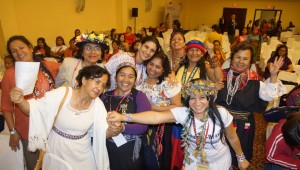 This chapter intends to bridge the gap between different theoretical and political debates around indigenous identities, crossing national and conceptual borders, to contribute to critically rethinking those constructions of “being indigenous” that may be based on new exclusions. I discuss the origins of the concept “indigenous and indigeneity”, historicizing the transnational processes through which these concepts have been appropriated as spaces for political organization and anti-colonial struggles in the last three decades. I place these processes in the context of the debates around multicultural reforms and indigenous rights in Latin America. Criticisms of the concept of “indigenous” that have emerged from the study and political struggle of other subaltern identities are also addressed: transnational and diaspora studies, Afro-Latin and Mestizo studies, and feminist studies, to make a call for a more inclusive reformulation of the concept of “indigenous”. I conclude by pointing out the importance of listening to the diversity of voices that speak from their indigenous identities, and the political responsibility that those of us in academia have who support the recognition of indigenous rights.
This chapter intends to bridge the gap between different theoretical and political debates around indigenous identities, crossing national and conceptual borders, to contribute to critically rethinking those constructions of “being indigenous” that may be based on new exclusions. I discuss the origins of the concept “indigenous and indigeneity”, historicizing the transnational processes through which these concepts have been appropriated as spaces for political organization and anti-colonial struggles in the last three decades. I place these processes in the context of the debates around multicultural reforms and indigenous rights in Latin America. Criticisms of the concept of “indigenous” that have emerged from the study and political struggle of other subaltern identities are also addressed: transnational and diaspora studies, Afro-Latin and Mestizo studies, and feminist studies, to make a call for a more inclusive reformulation of the concept of “indigenous”. I conclude by pointing out the importance of listening to the diversity of voices that speak from their indigenous identities, and the political responsibility that those of us in academia have who support the recognition of indigenous rights.
Artículo de Divulgación: ATENCO: 6 Años de Impunidad, de From Victimization to Resistance: Women’s response to the use of sexual violence as a counterinsurgent weapon
In this paper, the author reflects on the way in which gender violence has been used by the Mexican government as part of its counterinsurgency campaigns against social movements, and on the response that victims of such violence have given to this murder strategy. In the context of the government of Felipe Calderón, the criminalization of social movements legitimized through legislative reforms has been accompanied by militarization and state violence. In this chapter, I will analyze how indigenous and rural women are suffering the consequences of the militarization of the country, creating a climate of insecurity and intimidation; above all, in those regions where there is a history of political organization by the peasants.
multimedia
Vindictas – TV unam
The program of TV UNAM titulated “Vindictas” is dedicated to women in science. This time, Aída Hernández shares the methodological and theoretical challenges involved in doing anthropology of violence in contexts of extreme violence. Based on her experiences doing activist research with female prisoners, relatives of the disappeared people, and indigenous women victims of sexual violence. The researcher reflects on what it means to put the body on the field during research and carry out a feminist anthropology that contributes to understand and confront the multiple violence that affects the lives of poor and racialized women in Mexico.
Documentary: Bajo la sombra del Guamúchil
The documentary Bajo la Sombra del Guamúchil tells us about the experience of indigenous and mestizo women (almost all of rural origin) imprisoned in the feminine area of Cereso Morelos, Mexico, where 206 women and 15 children have been isolated from society by a system of justice that sees in punishment and imprisonment a solution to the incapacity of a social model, which with exclusion and poverty has contributed to producing crime.
This video aims to bring us closer to these experiences of inequality, through the voices and writings of nine inmates, within the framework of the “Life Stories” workshop coordinated by R. Aída
Mas publicaciones disponibles gratuitamente en www.rosalvaaidahernandez.com
